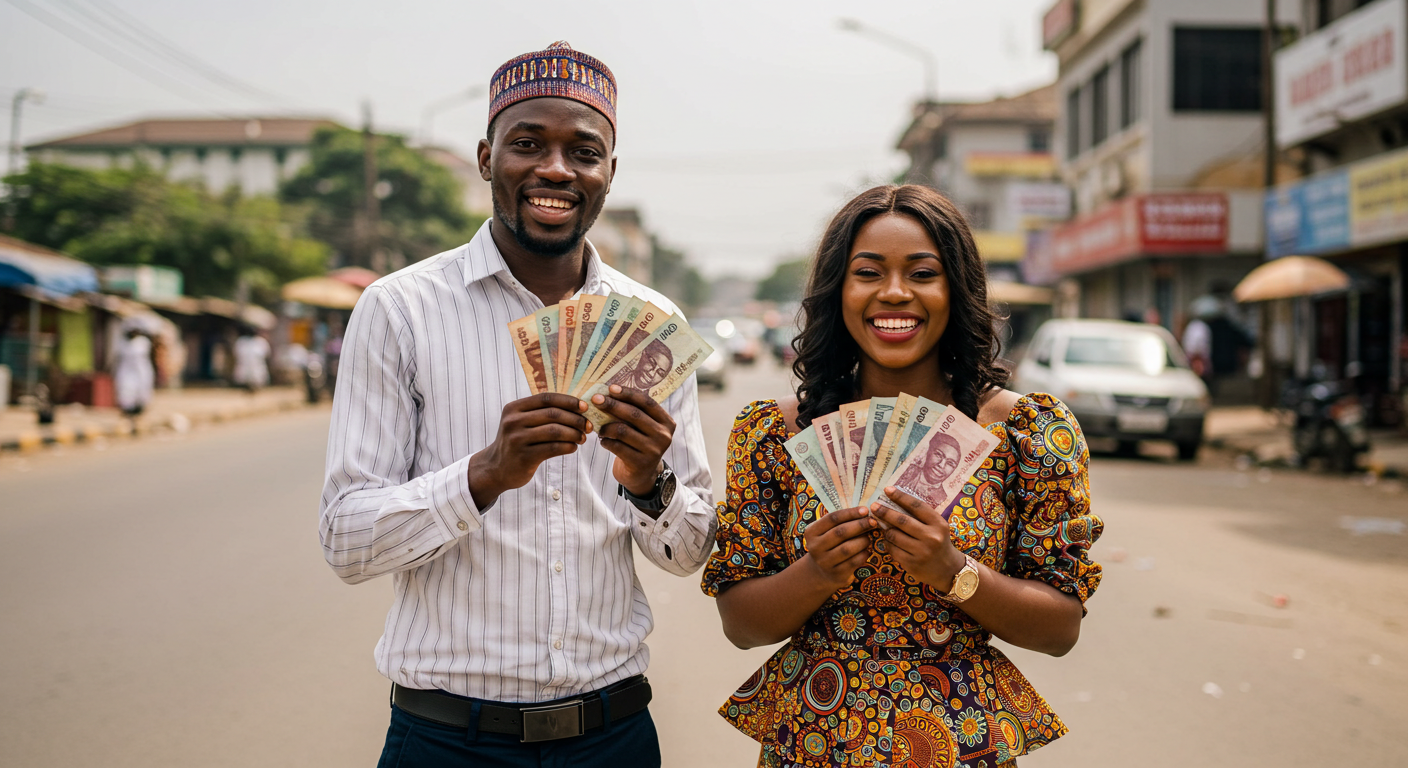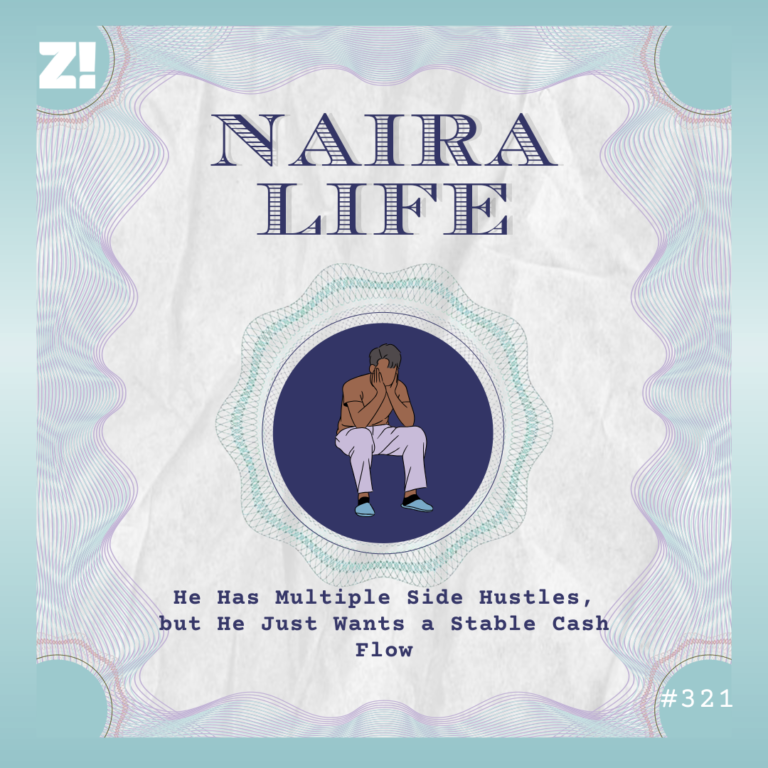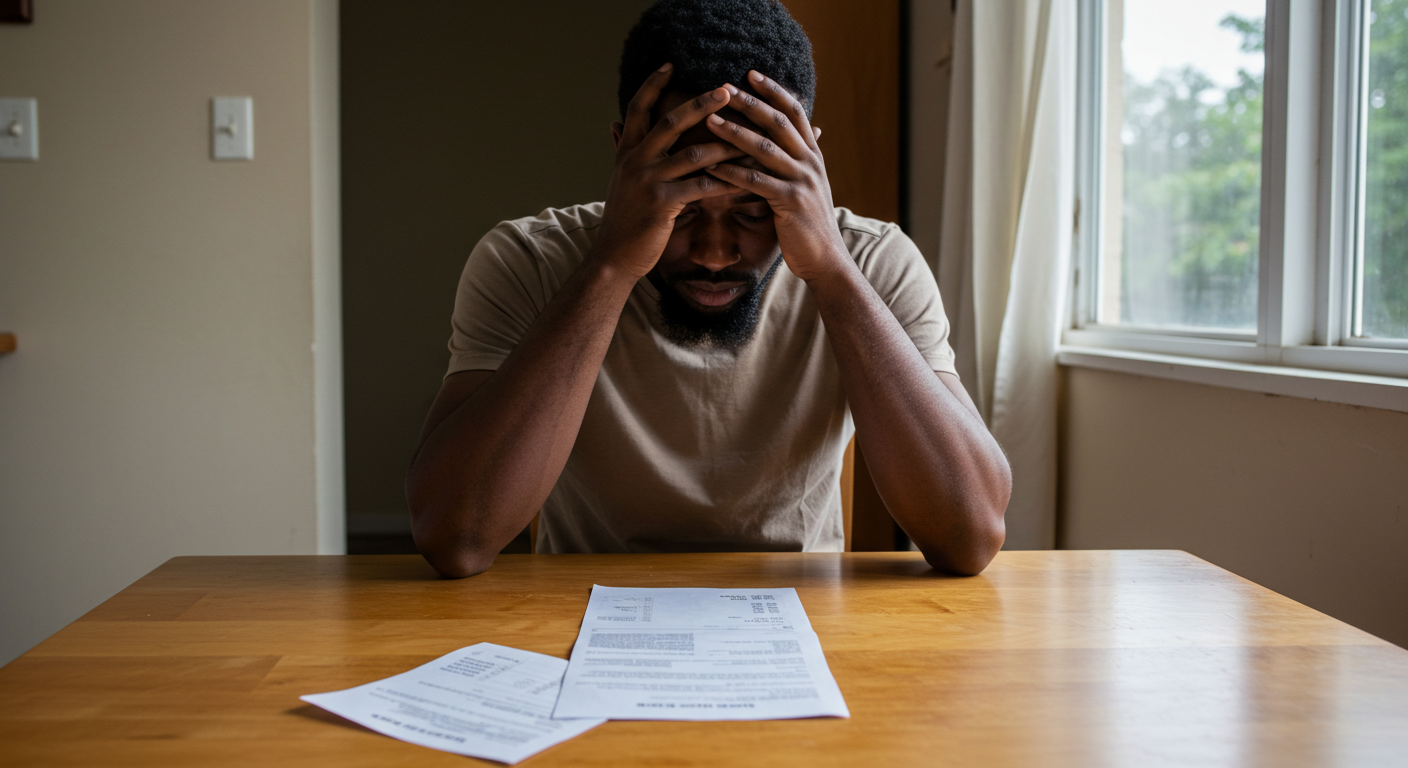Every week, Zikoko seeks to understand how people move the Naira in and out of their lives. Some stories will be struggle-ish, others will be bougie. All the time, it’ll be revealing.
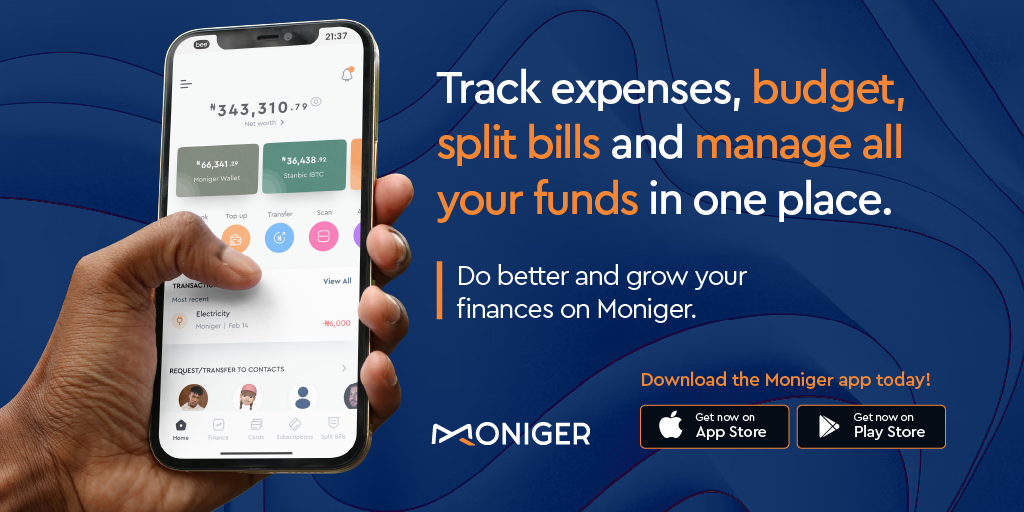
Your all-in-one money manager, Moniger, helps you to save money, manage your subscriptions, and track your expenses. Download the app and get started today!
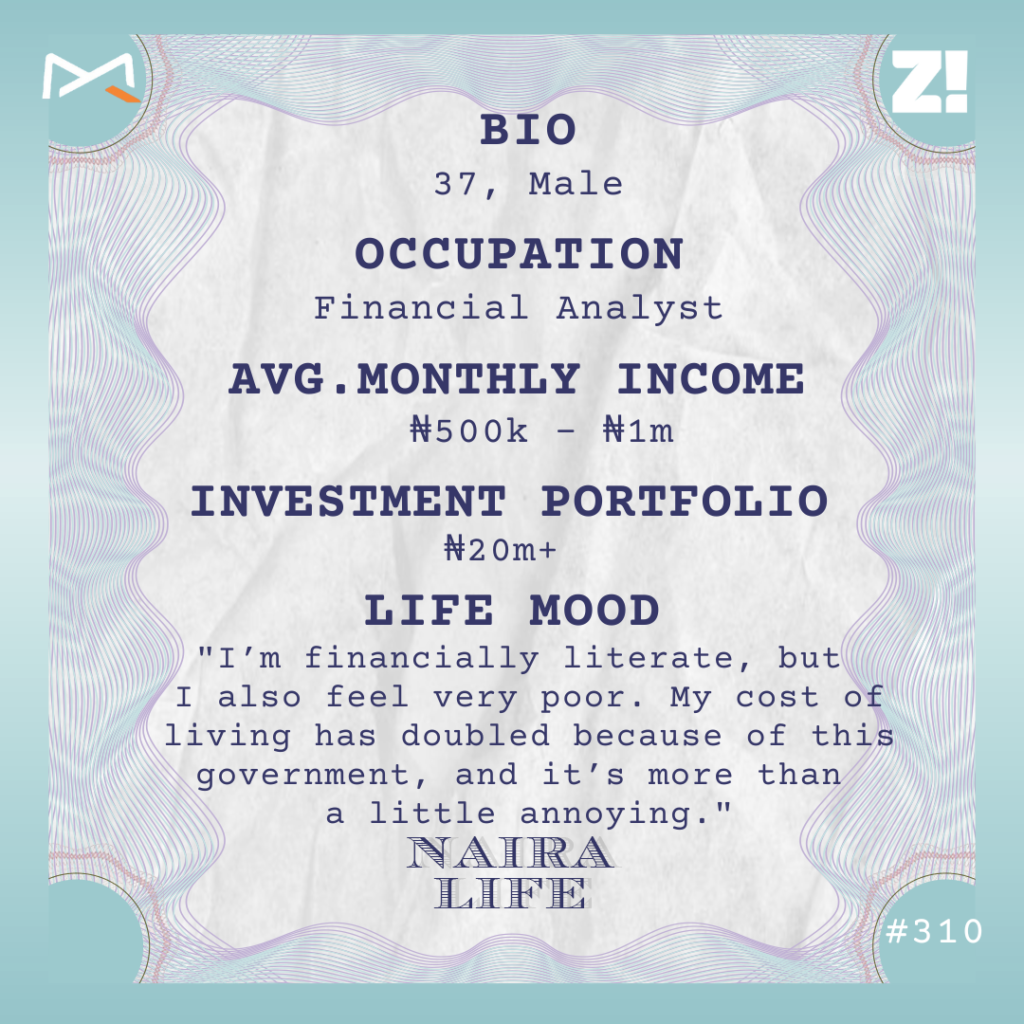
When did you first realise the importance of money?
2004, when I got into university. A decent meal cost between ₦300 – ₦500 in those days, and ₦1k meant I could go out, have fun, and eat. But I was in an environment where most people couldn’t afford that.
Watching how other people managed the little they had made me realise the value of money in a way I never had to think about before.
I assume this means there was money growing up
My parents were lecturers, and we had all the nice things. You could say we were upper middle class. My dad often flew around the country for work, and I remember my first time on a plane was for one of such trips.
My allowance in uni was generous enough to cover most of my needs. It started at ₦10k/month and grew to ₦30k by the time I left uni in 2008. My allowance continued after uni — usually between ₦40k and ₦50k — until 2015. I’m not exactly sure why the allowance ended. It just ended.
After uni, I bounced around a lot, from NYSC in 2010 to trying out postgraduate studies between 2011 and 2014. I dropped out halfway because I realised it was an absolute waste of time. In 2014, I started a car registration and document renewal hustle.
How did that happen?
I drove my parents’ car around for errands and my job was to make sure documents like insurance papers, roadworthiness, and the like were intact to avoid police wahala or having to bribe them. That’s where the idea came from.
I started by renewing my parents’ papers. Then, I extended the service to family and friends. I charged ₦1k per document because it comfortably covered my transport fare to the registration office.
I made between ₦5k – ₦7k weekly. I continued these runs even when I landed my first full-time job in 2016 and stuck with it until 2019.
Tell me about that first job
I worked as a financial analyst at a business publication, writing about the economy, crypto, and the stock market. My starting salary was ₦60k/month, which grew to ₦120k by 2019 when I left the company. In addition to the pay, I also received bonuses and extra allowances whenever I travelled for work.
After I left the job, I had a three-month stint as a financial analyst at a fintech company, where my salary jumped to ₦300k. I left because the person who hired me moved elsewhere, and I followed them.
Better pay?
No, my role and salary remained the same. The new place was a financial services firm, and I put on more hats. I did everything from writing to financial advisory. Because of my job, I was exposed to multiple resources that taught me how to understand the financial market. I learned to look at money from different angles, apply the knowledge to my finances, and educate others.
By the time I left in October 2024, my salary had grown to ₦450k plus extra ₦200k – ₦300k in bonuses annually. Also, I’d learnt enough to offer financial advisory as a self-employed analyst and had started building my own startup.
Interesting. How’s that working out?
Financial advisory is what pays my bills right now. I offer one-on-one sessions to clients who want to know how to make their money work for them. I typically charge between ₦50k – 100k/year per client, which covers about four or five calls. Then, I create a financial plan they can execute, including investment advice, and check in two or three times within a year.
I get up to five clients monthly. I’m fairly visible on social media, so I get clients from there. I also get a lot of referrals from family and friends. I currently have 32 clients on my roster, but I don’t get paid at the same time, so my monthly income averages between ₦500k – ₦1m. Sometimes it’s less.
How about your startup?
The startup’s value proposition is providing stock market and crypto research to Nigerians and Africans who need this information to make market and investment decisions. I’ve noticed there’s a gap in the market on data like this.
Many young Nigerians are increasingly investing in crypto and the stock market, but few resources explain these markets in a way that almost everyone can understand. So, I’ll do that for a fee.
It’s still in development, so I don’t expect to make money from it for about two years. Right now, I just want to get as much social media attention as possible. Then, I can start thinking about profitability.
So, you provide investment advice. What’s your own investment strategy like?
I primarily invest in naira and dollar stocks, as well as crypto and treasury bills. Crypto has been my most profitable investment channel.
Could you break it down?
I invested $500 in Bitcoin when it was $10k in 2019. I sold my holdings in December 2024 — Bitcoin was now worth $100k, and I made about ₦8m from that sale. Then, I dumped the money in treasury bills.
I still have some other coins in my portfolio. There’s 0.5 BNB, which I bought at $20 in 2019 and is now worth over $300. Then I got one Solana at $60 in 2023, which is now worth $190. I also bought $1k worth of Ethereum last year when it was around $3k. I’ll probably sell it when it reaches $6k.
Then, there are small amounts in a few coins, but these three coins are my current major crypto holdings.
I should mention that I’ve also lost money in crypto. In 2020, I bought LUNA and some other “worthless coins” and lost $1k when they crashed. I also lost money on a crypto exchange that got hacked. So, it’s not all good news.
The rest of my investments — the bulk of them— are in stocks and dollar investments.
Tell me about them
I’ll break it down into dollar and naira assets.
I have about $4400 in stocks, exchange-traded funds, real estate and fixed-income assets divided across different investment platforms, which I’ve been building monthly since 2019. Then, I have $1k cash at hand.
My naira assets include about ₦11 million invested in Nigerian stocks, mutual funds, and treasury bills. I also bought a piece of land for ₦2.5m last year.
I use a financial management app called Moniger to manage my cash, set a monthly budget, and track my expenses. I linked all my bank accounts so I can see all my transactions on Moniger’s dashboard and easily detect when I’m going overboard.
I still use my trusted Excel sheet to track my investments and assets, but this app has been helpful for budgeting and day-to-day expenses.
ALSO READ: I’m 22, and This Is How I Grew My Money by 29% in 2024
Speaking of budgeting, what does your typical month in expenses look like?
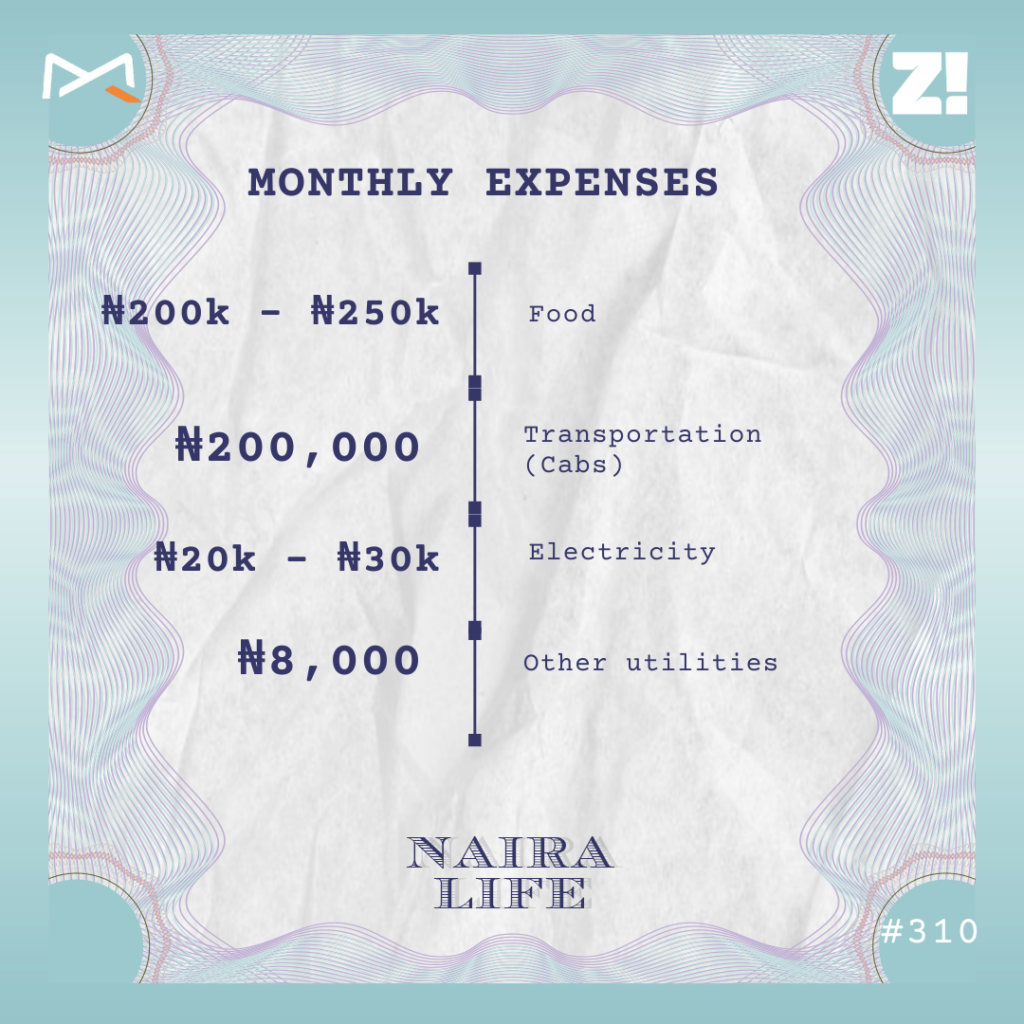
I’ve been self-employed since October 2024, so I’ve reduced my expenses to the barest minimum. Fortunately, I live in a family house, so I don’t pay rent. I also pay for a yearly internet bundle, so that’s ₦200k for my two internet service providers.
What kind of life would you say your income affords you?
Honestly, I feel poor. You might say I’ve made money over the years, but that’s because of my privilege. If I were paying rent, I wouldn’t have had the leeway to invest and build my portfolio the way I have.
Between 2019 – 2022, I invested half of my monthly salary and still had enough to live comfortably. But since our president arrived, the cost of everything has gone up, and I can no longer do that. Now, I can only manage to invest about 10% of my monthly income.
My net worth is around ₦20m, but I’d need 5x the number to live the kind of lifestyle I want. For instance, I’d like to buy a 2018, 2020 or 2022 Mercedes GLE SUV, and that would cost about ₦80m – ₦100m. Even if I gather all my money and hustle, I can’t afford that car.
Also, a car I could’ve gotten for ₦4.5m last year jumped to ₦10m – ₦15m after the naira devaluation.
Besides cars, I’d like to travel a bit more, which is also expensive. I visited a West African country twice last year and hope to do the same this year. It’ll probably set me back like ₦1.5m to visit now.
Out of curiosity, do you think you’ll ever return to a 9-5?
Never ever. My thinking after leaving my job was to get another one at a bigger firm abroad. But foreign employers don’t want to hire Nigerians if you don’t live in the US or the UK. So, when that didn’t work out, I decided to do my own thing. Plus, I’ve realised that self-employment will be more profitable in the long run.
The average finance person earns between ₦450k – ₦3m monthly. I can make that in a month. In five years’ time, I’ll have built a company I can sell for a million dollars and turn my finances around. There’s no way my five-year salary at a 9-5 would be up to $1m, except it’s a job at JP Morgan. Besides that, I’m not interested.
What was the last thing you spent money on that required serious planning?
I recently supported a sibling who relocated last year. I saved for a few months and liquidated some of my investments to give them ₦1m in batches of ₦350k and ₦650k.
It wasn’t really expensive, but it took some months of planning because I was still earning ₦450k and couldn’t live on half my salary.
How would you rate your financial happiness on a scale of 1-10?
4. I’ve been blessed to work with companies that trained me pretty well and gave me the knowledge I use for investment today. I’m financially literate, but I also feel very poor. My cost of living has doubled because of this government, and it’s more than a little annoying.
If you’re interested in talking about your Naira Life story, this is a good place to start.
Find all the past Naira Life stories here.


